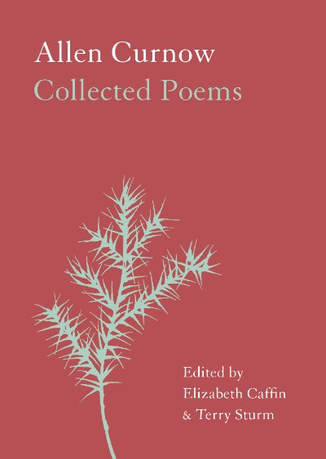
Allen Curnow: Collected Poems
edited by Elizabeth Caffin & Terry Sturm
Many of Curnow’s poems have been absorbed so effectively into our consciousness that coming across them in the pages of this collection is like rediscovering a temporarily forgotten piece of oneself. ‘Wild Iron’, ‘Landfall in Unknown Seas’, ‘Time’, ‘Continuum’, the passionate and sensuous ‘Spectacular Blossom’, ‘The Skeleton of the Great Moa’ (his most widely quoted poem), and ‘Pacific 1945-1995’ are examples of these.
J.G.A Pocock, on discovering the early Island and Time poems, was struck by the way that they appeared to reject history, or to represent a new understanding of it as intimate snapshots of immediate experience: ‘Wasn’t this the site, asked the historian, / Of the original homestead? / Couldn’t tell, said the cowman; / I just live here, he said, / Working for old Miss Wilson / Since the old man’s been dead.’ (From ‘House and Land’)
Curnow returned to imagined or real historical incidents in much later poems, but once again with the chief aim of making observations on the human condition. By this time, Curnow, while remaining ever a New Zealander, had also been rightfully claimed by the world. This is the poet as purveyor of knowledge. As Curnow himself wrote (quoted in Sturm’s biography) ‘… since no man is himself alone, but a member of mankind, the poem, if it is new and good finds and transmits some news about us all.’
There is a huge variety in Curnow’s poems. Excursions outside the most frequently anthologised reveal all sorts of surprises and insights, sometimes throwing interesting light on his character. For instance, after hearing public readings by several poets, including Curnow, at a Christchurch Arts Festival in 1973, young journalist Sue McCauley, seeking a lively reply that she might use in a piece for Thursday Magazine, had the temerity to ask publicly ‘Does anyone care?’ She was somewhat annoyed not to receive a useable answer; but in a poem written later by way of reply, Curnow remonstrated, with an unmistakable touch of pontifical condescension: ‘Rhubarb to you, / my dear, with cornflakes and cream, / every glorious carefree day and night of your life.’ (‘To An Unfortunate Young Lady…’.)
There are poems, like ‘Dichtung und Wahrheit’, that force us to reflect on the suppressed urges that bubble away not far beneath the surface of our lives, only to occasionally erupt, when the circumstances are sufficiently exceptional, in episodes of stunning brutishness. And there are others, such as one of those with the title ‘Lone Kauri Road’ that bring wonder and doubt into ordinariness: ‘Read for a bit. It squinted between the lines. / Pages were backing away. / Print was busy with what print does, / trees with what trees do that time of day, / sun with what sun does, the sea / with one voice only, its own, / spoke no other language than that one.’
At times, he conflates times and places into a kind of nervous flickering, establishing an equivalence between here and elsewhere, between is, was and will be, even seeming to question if reality exists outside the perception of the beholder. Poetry as quantum mechanics.
Words are played with. There are puns and double, triple meanings. This from ‘A Fellow Being’: ‘… dry on the beach / a ‘mature female’ reads the / Woman’s Weekly snuggling / bare breasts in warm sand / scallop and tuatua shells / lie around / unoccupied.’
Reading the poems will result in the discovery of new favourites. The elegance of his poetry is breath-taking. It arises, of course, from the mysterious alchemy of words precisely chosen and precisely placed. Many of the poems require a re-reading, more thought, and further re-reading to get at their true richness. This is as it should be, and it is no less than Curnow himself expected. He was not much concerned with ease of understanding (he was always bemused by the popularity of his readily-accessible ‘Wild Iron’), and wrote to his son, Tim, that his poems ‘were written strictly for reading, not for intravenous injection.’
Curnow’s poetry is our poetry, but its reach is universal. Collected Poems is a treasure trove, and AUP has done a splendid job in presenting it for our pleasure and mental stimulation. This volume, and Sturm’s biography, should sit side by side on a handy shelf, with a supply of bookmarks and a 5B pencil.
Editors: Elizabeth Caffin & Terry Sturm
Publisher: Auckland University Press
ISBN: 9781869408510
RRP: $59.99
Available: Bookshops

 RSS Feed
RSS Feed
